
If you’ve ever wondered about the impact sleep has on your overall health, then “How Does Sleep Affect My Health?” is the product for you. This informative guide is dedicated to exploring the intricate relationship between sleep and our physical and mental well-being. From understanding the importance of quality sleep to uncovering the potential consequences of inadequate rest, this comprehensive resource provides valuable insights that will help you prioritize a good night’s sleep for a healthier, happier life.
Physical Health
Immune System
Sleep plays a crucial role in supporting a healthy immune system. During sleep, your body produces and releases proteins called cytokines, which help regulate your immune response. These cytokines are essential for fighting off infections and reducing inflammation in the body. When you don’t get enough sleep, your immune system may become compromised, making you more susceptible to illnesses such as the common cold, flu, and even chronic conditions like autoimmune disorders.
Heart Health
Getting adequate sleep is vital for maintaining a healthy heart. Sleep deprivation has been linked to an increased risk of cardiovascular diseases such as high blood pressure, heart attacks, and strokes. During sleep, your blood pressure and heart rate naturally decrease, giving your heart a chance to rest and recover. Lack of sleep can disrupt these processes, leading to elevated blood pressure and increased strain on the heart. By prioritizing quality sleep, you can help protect your heart health and reduce the risk of cardiovascular problems.
Weight Management
Sleep has a significant impact on your body weight and metabolism. When you don’t get enough sleep, it can disrupt the balance of crucial hormones that regulate hunger and fullness, such as ghrelin and leptin. Inadequate sleep can lead to an increase in appetite and cravings for unhealthy, high-calorie foods. Moreover, lack of sleep can affect your body’s ability to process glucose efficiently, potentially leading to insulin resistance and weight gain. By prioritizing enough sleep, you can better manage your weight and support a healthy metabolism.
Mental Health
Emotional Well-being
Getting enough sleep is vital for your emotional well-being. Sleep deprivation can impact your mood, making you more prone to irritability, anxiety, and depression. Additionally, lack of sleep can impair your ability to regulate and process emotions effectively, leading to heightened emotional reactivity and reduced resilience. Prioritizing quality sleep can help stabilize your mood, improve emotional regulation, and enhance overall emotional well-being.
Cognitive Functioning
Sleep plays a crucial role in cognitive functioning. It is during sleep that your brain consolidates memories, enhances learning, and processes information. Adequate sleep improves attention, concentration, problem-solving abilities, and creativity. On the other hand, sleep deprivation can impair cognitive performance, memory retention, and decision-making skills. By getting enough sleep on a regular basis, you can optimize your cognitive functioning and promote better overall brain health.
Mood Disorders
Sleep disturbances and mood disorders often go hand in hand. Lack of sleep can contribute to the development or exacerbation of mood disorders such as depression and anxiety. Conversely, individuals with mood disorders may experience disrupted sleep patterns, including difficulty falling asleep or staying asleep. Addressing and prioritizing healthy sleep habits can be an essential component of managing and improving mood disorders, providing a foundation for better mental health.
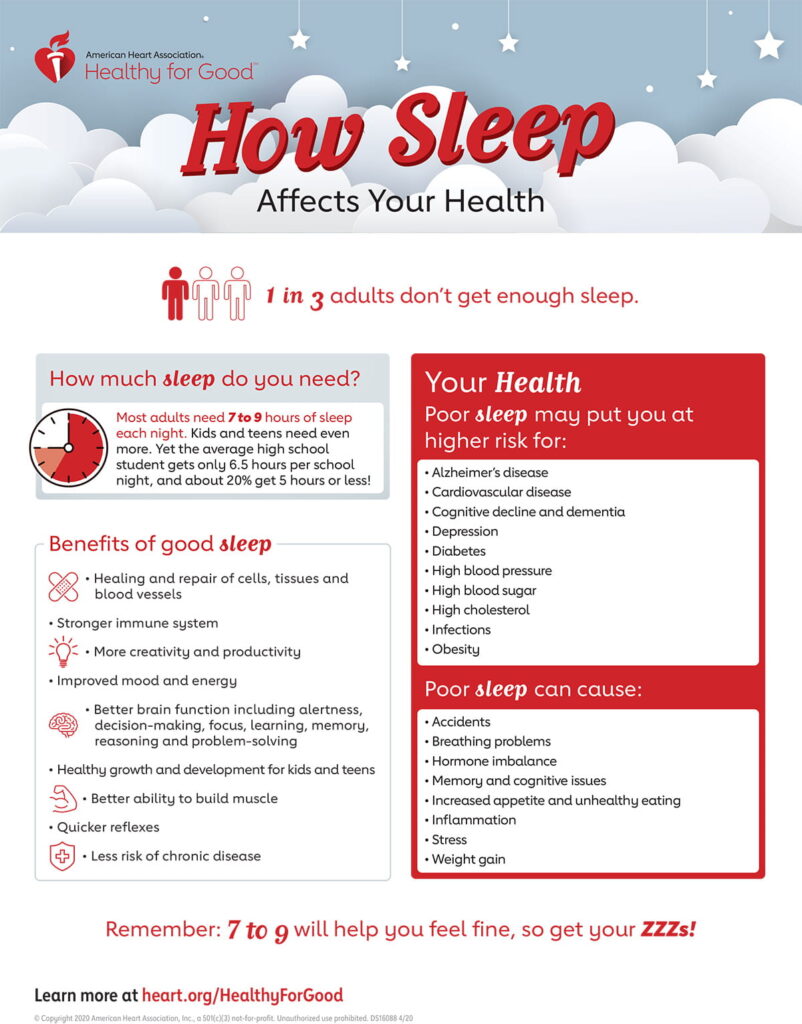
This image is property of www.heart.org.
Productivity and Performance
Concentration and Focus
Sleep is vital for maintaining optimal concentration and focus throughout the day. A good night’s sleep enhances cognitive abilities, making it easier to pay attention, absorb information, and complete tasks efficiently. On the contrary, insufficient sleep can lead to reduced attention span, decreased concentration, and impaired decision-making abilities. By prioritizing quality sleep, you can significantly enhance your concentration and focus, leading to improved productivity in all aspects of life.
Memory
Sleep is closely linked to memory consolidation and retention. During the different stages of sleep, particularly during deep sleep and rapid eye movement (REM) sleep, the brain processes information and solidifies memories. Lack of sleep can negatively impact both short-term and long-term memory, affecting your ability to retain and recall information. By establishing regular sleep patterns and allowing your brain to go through the necessary sleep stages, you can optimize memory formation and retention.
Creativity
Quality sleep can boost your creativity and problem-solving skills. During sleep, the brain engages in an intricate process of neural connections, which can contribute to enhanced creativity and originality in the waking state. Sleep deprivation, on the other hand, can impair creative thinking, limit innovation, and reduce overall cognitive flexibility. By getting sufficient sleep, you can unlock your creative potential and enhance your ability to think outside the box.
Safety and Accidents
Driving
Driving while sleep-deprived can be extremely dangerous. Drowsy driving impairs judgment, attention, and reaction time, significantly increasing the risk of accidents. Fatigue-related accidents can have severe consequences, not just for you but also for others on the road. It is crucial to prioritize adequate sleep before getting behind the wheel to ensure optimal alertness and minimize the risk of accidents.
Workplace Accidents
Lack of sleep can also impact workplace safety. Sleep-deprived individuals are more prone to making mistakes, experiencing accidents, and having reduced alertness and coordination. This can be especially concerning in professions that require working with heavy machinery, operating vehicles, or performing tasks that demand high levels of concentration. Prioritizing quality sleep can help promote workplace safety, reduce the risk of accidents, and enhance overall productivity.
Falls and Injuries
Insufficient sleep can significantly increase the risk of falls and injuries in daily life. Lack of sleep affects balance, coordination, and reaction time, making it more likely for accidents to occur. Whether it’s a trip or fall at home or during physical activities, sleep deprivation can impair your ability to prevent or recover from accidents. By ensuring you get enough sleep, you can reduce the risk of falls and injuries, keeping yourself safe and maintaining your overall well-being.
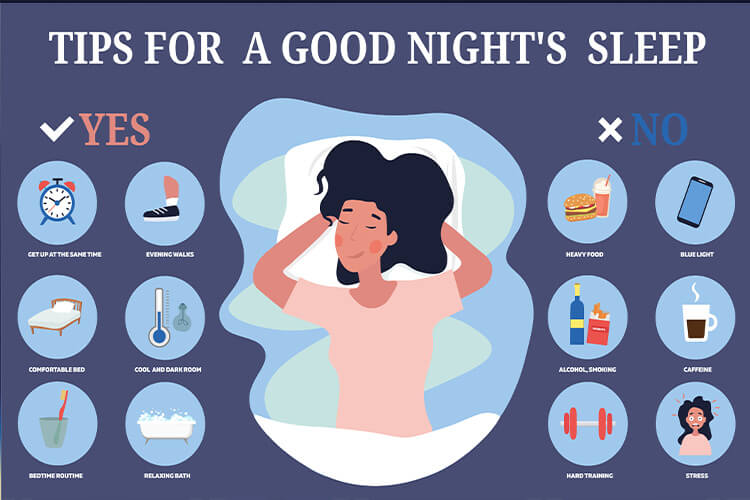
This image is property of www.kelsey-seybold.com.
Chronic Conditions
Diabetes
Sleep plays a vital role in managing and preventing diabetes. Lack of sleep or poor sleep quality can contribute to insulin resistance, making it challenging for your body to properly regulate blood sugar levels. Insufficient sleep has also been associated with an increased risk of developing type 2 diabetes. On the other hand, maintaining healthy sleep habits can help improve insulin sensitivity, support blood sugar regulation, and reduce the risk of diabetes.
High Blood Pressure
There is a strong connection between sleep and blood pressure. Inadequate sleep can lead to an elevated blood pressure, increasing the risk of developing hypertension or worsening existing high blood pressure. During sleep, your blood pressure naturally lowers, allowing your cardiovascular system to rest and recover. By prioritizing quality sleep, you can help maintain healthy blood pressure levels and reduce the risk of hypertension.
Obesity
Lack of sleep has been linked to obesity and weight gain. Sleep deprivation can disrupt the balance of appetite-regulating hormones, leading to an increase in appetite and cravings for unhealthy foods. Moreover, insufficient sleep affects the body’s ability to process glucose efficiently, potentially contributing to insulin resistance and weight gain. By prioritizing enough sleep, you can support a healthy weight and reduce the risk of obesity.
Hormonal Imbalances
Decreased Libido
Sleep deprivation can have a negative impact on sexual health and libido. Lack of sleep affects hormone production, particularly testosterone levels, which can lead to a decrease in sexual desire and performance. Additionally, fatigue and decreased energy levels from inadequate sleep can contribute to a decreased interest in sexual activities. Prioritizing quality sleep can help restore hormonal balance and support a healthy libido.
Irregular Menstrual Cycles
Sleep disturbances can disrupt the hormonal balance in women, leading to irregular menstrual cycles. Research has shown that women who experience insufficient sleep or poor sleep quality are more likely to have irregular menstrual cycles, including skipped periods or prolonged cycles. By establishing consistent sleep patterns, women can regulate their hormonal balance, improve menstrual regularity, and support reproductive health.
Impaired Fertility
Sleep plays a crucial role in fertility, both for men and women. Sleep deprivation can disrupt hormone regulation, impair reproductive functions, and decrease fertility. In women, insufficient sleep is associated with irregular menstrual cycles and reduced chances of conception. In men, lack of sleep can lower testosterone levels, affecting sperm production and quality. Prioritizing adequate sleep is essential for maintaining optimal fertility and increasing the chances of successful conception.
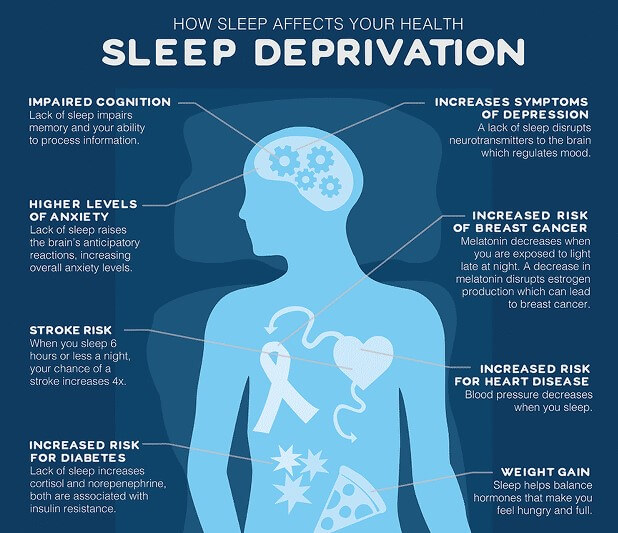
This image is property of www.atriummednyc.com.
Aging and Longevity
Cellular Aging
Quality sleep has been linked to cellular rejuvenation and anti-aging effects. During sleep, the body repairs and regenerates cells, helping to prevent cellular damage and slow down the aging process. Sleep deprivation can lead to increased oxidative stress, inflammation, and accelerated cellular aging. By consistently prioritizing quality sleep, you can support healthy aging and maintain youthful cellular function.
Longer Lifespan
Adequate sleep is associated with a longer lifespan. Studies have shown that individuals who consistently get enough sleep tend to have a reduced risk of premature death. Prioritizing quality sleep contributes to overall better health, reducing the risk of chronic diseases and promoting longevity.
Brain Health
Sleep is essential for maintaining optimal brain health and cognitive function as you age. Chronic sleep deprivation can increase the risk of cognitive decline, including conditions such as Alzheimer’s disease and other forms of dementia. Adequate sleep allows for the removal of toxins from the brain, which can be crucial for preventing the build-up of amyloid plaques associated with Alzheimer’s disease. By getting enough sleep, you can support brain health, preserve cognitive functioning, and reduce the risk of age-related cognitive decline.
Immune System
Inflammation
Sleep plays a vital role in regulating inflammation in the body. Chronic inflammation is linked to numerous health problems, including heart disease, diabetes, and autoimmune disorders. Insufficient sleep can disrupt the balance of inflammatory proteins in the body, leading to increased inflammation and a higher risk of developing inflammatory conditions. By prioritizing quality sleep, you can help reduce inflammation and support a healthy immune system.
Increased Susceptibility to Infections
Lack of sleep can weaken your immune system, making you more susceptible to infections. During sleep, your body produces and releases proteins, such as cytokines, that help fight off infections and reduce inflammation. When you don’t get enough sleep, your immune system may become compromised, making it harder for your body to defend against pathogens like bacteria and viruses. By ensuring you get adequate sleep, you can strengthen your immune system and better protect yourself against infections.
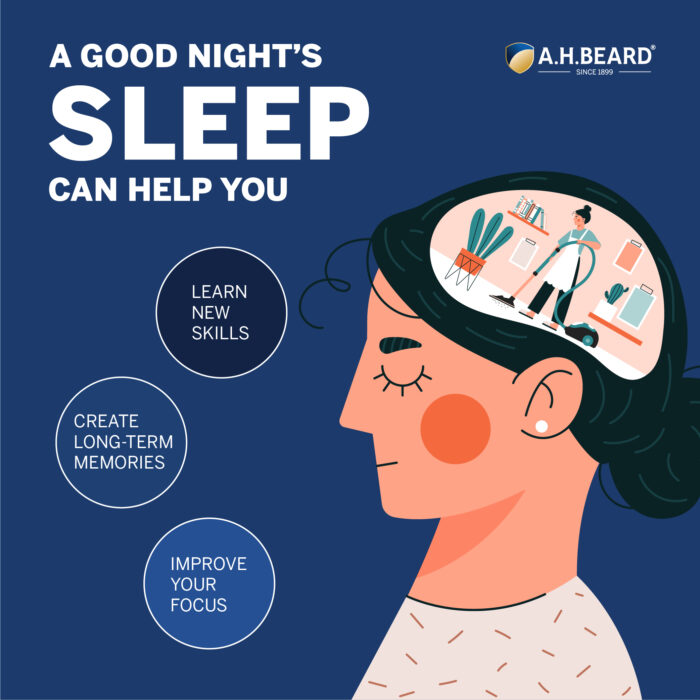
This image is property of ahbeard.com.
Metabolism
Appetite Regulation
Sleep plays a significant role in appetite regulation. Inadequate sleep can disrupt the balance of hunger-regulating hormones, leading to increased appetite and cravings for unhealthy foods. Lack of sleep has been linked to higher body mass index (BMI) and a higher risk of obesity. Prioritizing quality sleep can help regulate appetite, reduce overeating, and support a healthy weight.
Glucose Metabolism
Sleep is essential for proper glucose metabolism. Insufficient sleep can impair the body’s ability to regulate blood sugar levels, leading to increased insulin resistance and a higher risk of developing type 2 diabetes. By maintaining regular sleep patterns and getting enough sleep, you can support healthy glucose metabolism and reduce the risk of insulin-related health issues.
Overall Well-being
Quality of Life
Quality sleep is crucial for overall well-being and a high quality of life. When you consistently get enough sleep, you’ll feel more energized and refreshed, improving your mood and overall outlook on life. Adequate sleep enhances your physical and mental health, allowing you to engage fully in daily activities, pursue your passions, and maintain fulfilling relationships.
General Health
No aspect of your health can be truly optimized without prioritizing quality sleep. Sleep is a fundamental pillar of overall health and well-being. By maintaining healthy sleep habits, you can reduce the risk of developing chronic conditions, support your immune system, and enhance both physical and mental functioning.
Long-term Wellness
Prioritizing quality sleep is crucial for long-term wellness. Chronic sleep deprivation can have detrimental effects on your health, increasing the risk of chronic diseases, mental health issues, and decreased overall quality of life. On the contrary, consistently getting enough sleep supports all aspects of your well-being, allowing you to age gracefully, maintain optimal health, and enjoy a fulfilling and vibrant life.
In conclusion, sleep plays a vital role in all aspects of your health and well-being. By prioritizing quality sleep, you can support your immune system, maintain a healthy heart, manage your weight, enhance cognitive abilities, improve mood, and reduce the risk of accidents and chronic conditions. From physical health to mental well-being, sleep is the foundation for a healthy and fulfilling life. Make sleep a priority, and reap the many benefits it offers for your overall health and longevity.
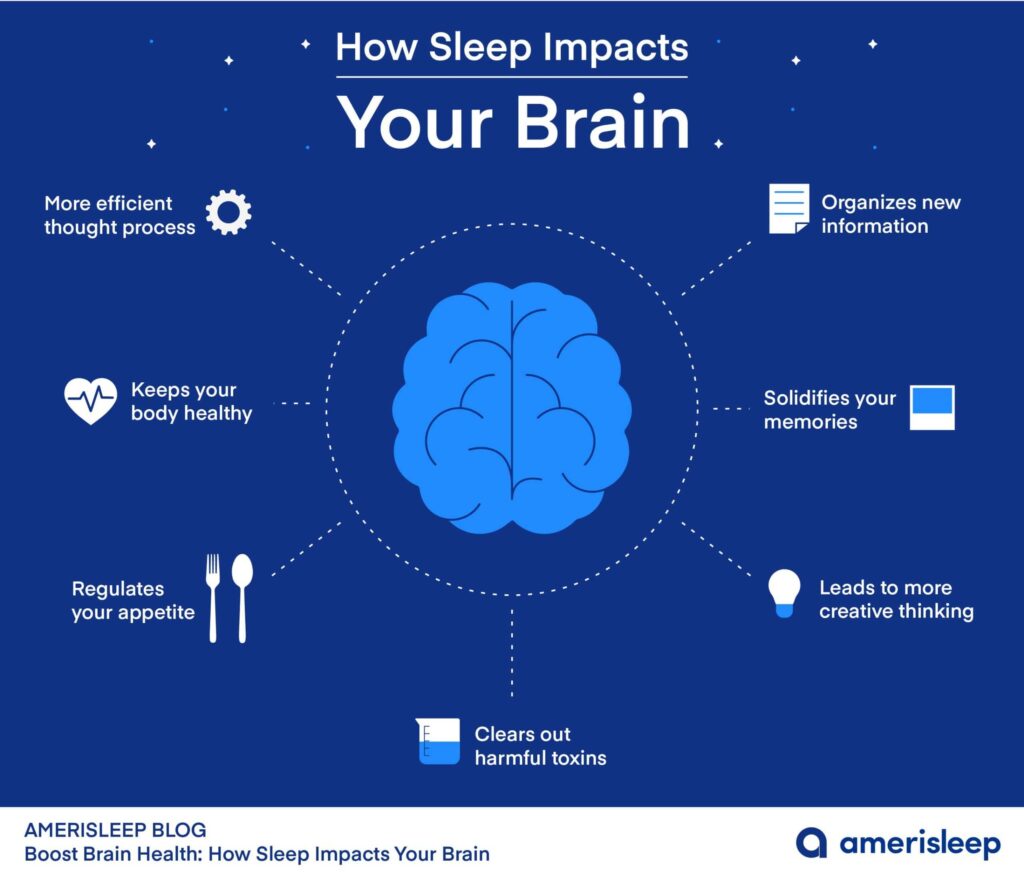
This image is property of amerisleep.com.